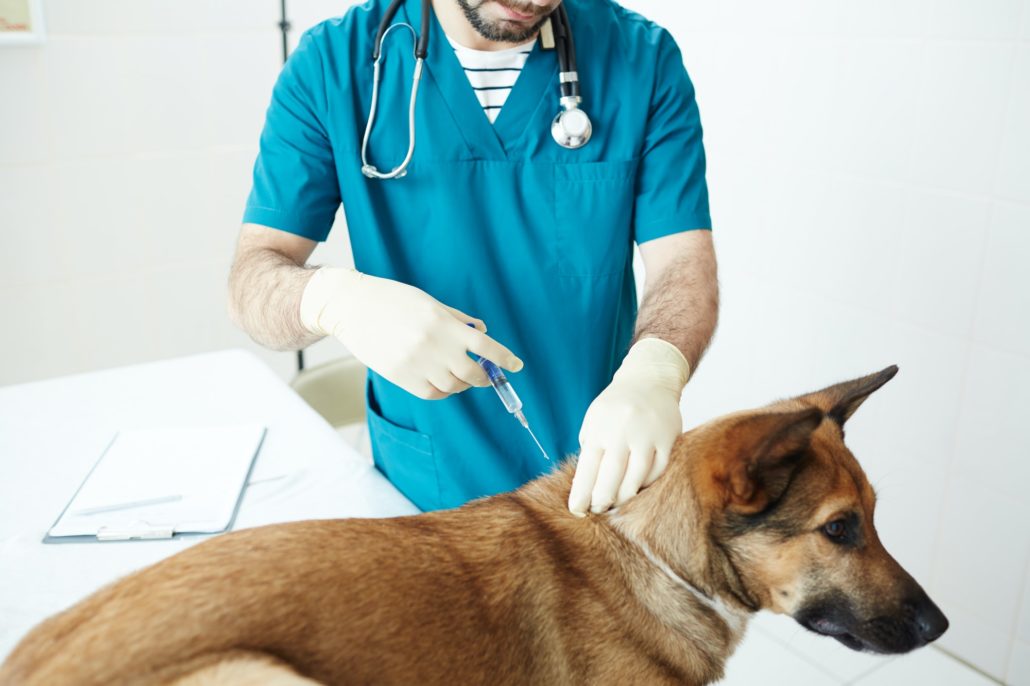3961 Hastings Street
Burnaby, BC V5C 2H8
604 291 6666
Client Support
Mon - Thu: 8AM - 6PM | Fri: 7AM - 5PM
Online store always open
Burnaby, BC V5C 2H8
Client Support
Online store always open

Routine vaccinations are essential for prevention of infectious diseases in puppies. Puppies receive immunity against infectious disease in their mother’s milk; however, this protection begins to disappear between 6 and 20 weeks of age.
An appropriate vaccination program for adult dogs should be based on your pet’s lifestyle.
Before the days of effective vaccines, dogs routinely died from distemper, hepatitis, leptospirosis, parvovirus, and complications of upper respiratory infections.
Current vaccination programs protect your dog from these and the threat of rabies.
Puppies receive immunity against infectious disease in their mother’s milk; however, this protection begins to disappear between 6 and 20 weeks of age.
To protect puppies during this critical time, a well-researched approach is taken: a series of vaccines is given every 3-4 weeks until the chance of contracting an infectious disease is very low.
All vaccines require booster immunizations (“shots”) that are given one year later. Depending on the type of vaccine, your pet will then receive boosters on a yearly or every 3 year schedule for their adult life.
If your adult dog has an adverse reaction to the vaccine (fever, vomiting, shaking, facial swelling, or hives), discuss the risk of annual revaccination with your veterinarian.
Puppies 4 to 20 weeks of age: in puppies, a series of vaccines is recommended. These should begin between 6 to 8 weeks of age, and be boostered every 3 to 4 weeks until your puppy is approximately 16 weeks old. Our veterinarians recommend that the average puppy in the lower mainland be vaccinated for DHPP (distemper, hepatitis, parainfluenza, and parvovirus), leptospirosis, bordetella, and rabies. If you and your dog spend lots of time in the great outdoors, ask your veterinarian about the lyme disease vaccine.
Specific vaccine requirements for individual dogs should be discussed with your veterinarian. The most appropriate vaccination program for your pet should be followed.
Distemper is a contagious viral disease that affects the respiratory and nervous system of dogs.
It is a serious illness that is almost always fatal. This is included in the DHPP vaccine.
Hepatitis is a canine adenovirus disease that affects the liver and eyes and may cause reproductive problems. This is included in the DHPP vaccine.
Hepatitis is not contagious to people.
Leptospirosis is a bacterial infectious disease that causes severe liver and kidney damage and may also affect humans.
Lyme disease is a tick-transmitted disease spread through bites.
Only a few dogs (about 5-10%) will display obvious symptoms such as lameness, lethargy, fever, and swollen joints.
While not contagious between pets and humans, tick bites may spread the disease if the same tick that bit your dog bites you too.
Parainfluenza is a highly contagious viral respiratory disease that may spread quickly from dog to dog. This is included in the DHPP vaccine.
One of the most serious contagious diseases for puppies, parvovirus causes severe vomiting and diarrhea while suppressing the immune system and may be fatal – even if treated. This is included in the DHPP vaccine.
Rottweilers, Doberman pinschers, and Pitbulls seem to be more susceptible than other breeds.
Rabies is a serious public health concern because the virus is carried by mammals including raccoons, skunks, foxes, bats, dogs, and cats and can be transmitted to humans.
The virus is spread through wounds, via the saliva of a rabid animal, and causes symptoms such as: overly vicious or timid behaviour, lack of coordination, and difficulty swallowing.
Once these symptoms appear, the disease is fatal. While there is an effective post-exposure treatment for humans, there is none for animals.
Bordetella is one of the bacterial causes of “kennel cough.” Signs like a honking cough during the night can be stressful for the dog as well as the owner.
Dog vaccinations are essential to your pet’s health and a part of good dog care.
To learn more about vaccination programs for your best friend, visit us at Unit 102 at 3961 Hastings Street, Burnaby, BC, V5C 2H8; or phone: 604‐291‐6666.
From puppy to senior care, explore all the other cat-related pages that we created for you!
Sign up for our newsletter to receive the best tips, articles and other resources for your pet’s health.
08:00 AM - 6:00 PM
08:00 AM - 6:00 PM
08:00 AM - 6:00 PM
08:00 AM - 6:00 PM
07:00 AM - 5:00 PM
We are closed